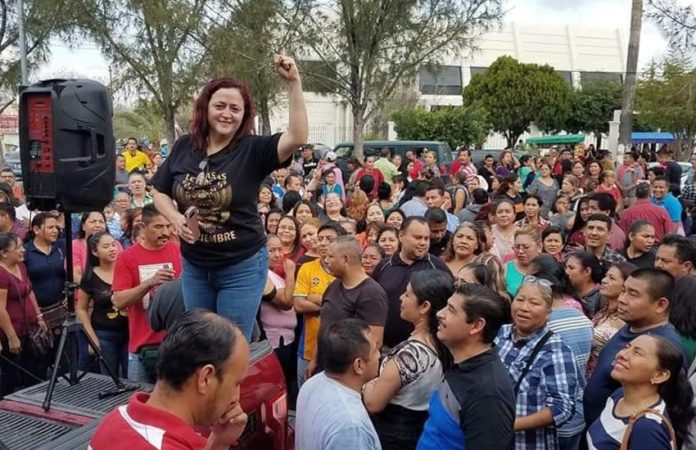The largest labor federation in the United States said it would file on Monday the first petition for the U.S. government to lodge a complaint against Mexico under the terms of the new North American free-trade agreement, which took effect last year.
The American Federation of Labor and Congress of Industrial Organizations (AFL-CIO) states in its petition, which it shared with the Reuters news agency, that employees at the Tridonex auto parts plant in Matamoros, Tamaulipas, were denied the right to independent union representation in violation of the United States-Mexico-Canada Agreement (USMCA).
The agreement, which came into force on July 1, 2020, was designed to give greater power to workers to demand better wages, which have stagnated in Mexico since the now-defunct North American Free Trade Agreement (NAFTA) took effect at the start of 1994. As a result, salaries in Mexico now rank as the lowest among the 37 member countries of the Organization for Economic Cooperation and Development.
Although the USMCA enshrines workers’ right to independent representation and gives them more power to negotiate higher wages — a provision also designed to stem the loss of U.S. jobs to Mexico due to the lower wages paid here — hundreds of Tridonex employees were effectively blocked from joining the union of their choice.
The workers, unhappy with its current representation by the SITPME union because it didn’t support their fight for higher wages in 2019, sought to be represented by a new labor organization led by lawyer and activist Susana Prieto.

But state labor officials never scheduled an election, Reuters reported, adding that Prieto claimed that 600 of her supporters at Tridonex — a subsidiary of Philadelphia-based Cardone Industries, which is controlled by Canada’s Brookfield Asset Management — were fired last year “in what some workers described as retaliation for their efforts to switch unions.”
The AFL-CIO’s petition — supported by the union that represents U.S.-based Cardone workers, Prieto’s union and the U.S. nonprofit Public Citizen’s Global Trade Watch — will put the USMCA’s labor enforcement provisions to the test for the first time, a case that will be closely watched by companies bound by the pact as well as labor activists.
According to the trade agreement’s “Rapid Response Mechanism,” firms can be sanctioned with tariffs or other penalties if they don’t guarantee workers’ rights such as the freedom to choose their union.
Cathy Feingold, director of the international department of the AFL-CIO, which fought for the inclusion of improved workers’ rights provisions in the USMCA, said the Tridonex case will be precedent-setting and a test for the new system created by the new three-way trade agreement.
The AFL-CIO’s petition will go to the U.S. Office of Trade and Labor Affairs, which will have 30 days to review it and determine whether to take the case to the Mexican government.
If it decides to do so, labor officials in Mexico would collaborate with their counterparts in the United States to come to an agreement on terms of remediation, according to Reuters. The news agency said the entire process, which would include a final stage to determine potential sanctions on Tridonex and penalty fees, must be resolved in no more than five months.
Benjamin Davis, director of international affairs for the United Steelworkers, which is part of the AFL-CIO, said most of the issues “could get fixed pretty quickly if the political will is there.”
Before the USMCA was ratified by the three North American trade partners, President López Obrador, who has pledged to get rid of “protection contracts” that are common in Mexico and seen by critics as favoring company interests over workers’ rights, promulgated a labor reform package that sought to give greater rights to company employees, democratize unions and give them more power to negotiate more effectively on behalf of their members.
But the 2019 reform is being implemented gradually and will not reach Tamaulipas — and the Matamoros Tridonex workers — until next year, Reuters said.
Davis said that Mexico has a responsibility to ensure that the reform doesn’t remain on paper but is implemented on the ground.
“The rights start right away, even if institutions aren’t in place yet,” he said.
Source: Reuters (en)
